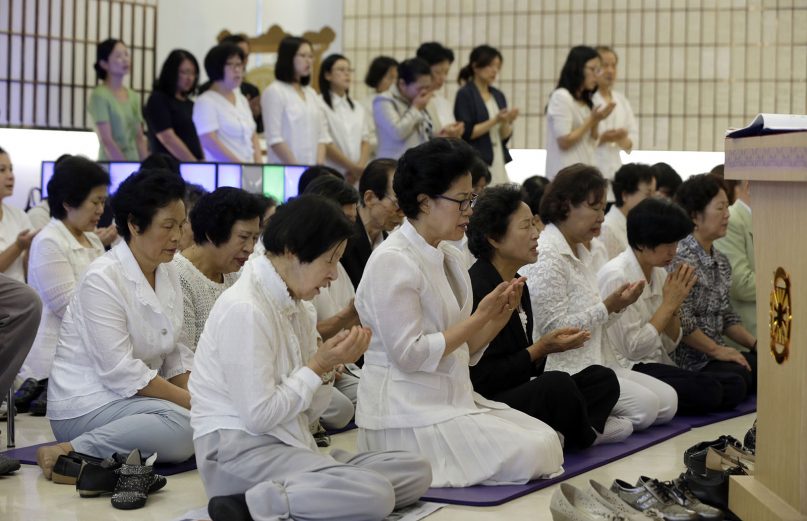(RNS) — The Trump administration has repeatedly made religious freedom a priority. If it wants to keep its credibility on the issue, the White House would do well to pay attention to a court ruling in Washington, D.C., Superior Court in November involving the Unification Church — the movement known in the American press as “the Moonies.”
The central question in the lawsuit, which had been going on since 2011, involves a succession dispute and theological debate among the Unification Church’s members. But its implications could affect nearly every religious minority in the United States. If the D.C. court’s partial summary judgment stands unchallenged, it will weaken religious freedom protections for all Americans and particularly for newly established faith groups.
The Unification Church movement began in South Korea in the mid-1950s with the preaching of the Rev. Sun Myung Moon, who touted a mix of Christian and Confucian theology. The present case, known as Family Federation for World Peace and Unification International (FFWPUI) v. Hyun Jin Moon, found its way into D.C. Superior Court because it involves the assets of a nonprofit corporation formed in the district in 1977, about the time Moon was expanding his purchases of real estate and businesses in the United States, including one of New York’s largest hotels.
Five years later, the church set Americans abuzz when Moon officiated a mass wedding for more than 2,000 couples in Madison Square Garden. In the following decade, these prearranged marriages, as well as rumors of cultlike brainwashing, generated sensationalist press stories worldwide. The attention fizzled out only after Eileen Barker, a prominent British sociologist who had studied the movement for seven years, discounted the accusations of brainwashing.
The dispute before the court, driven by members of the founder’s family’s differing theological interpretations of what he intended, is as old as religion itself. Moon died in 2012, and his widow, Hak Ja Han Moon, who refers to herself as the messianic-sounding “only begotten daughter,” claims that all the philanthropic assets of the Unification movement are hers alone to manage. She is opposed by one of her sons, Sean Moon, who pastors a 200-member congregation while wearing a leather crown with rifle shells and sporting a gold-plated AR-15.
According to recent reports, Sean believes that the Book of Revelation’s “rod of iron” is God-speak for an AR-15. He calls for armed followers to help Jesus keep the peace. Sean also claims he is the real heir to the Moon movement.
What is evident is that Moon’s widow and his son Sean have effectively started their own dissenting churches, against Moon’s clear wish to create not a new denomination but a spirituality to unify all religions. As the “Unification” movement name implies, his theory was that people of all faiths could join the movement without abandoning their own faiths.
Further, his movement did not admit hierarchies of any kind other than a familial structure. The only family member who seems to grasp this intent is Moon’s oldest living son, Preston Moon, a Harvard graduate who has been investing his time, energy and philanthropic endeavors into projects to strengthen families.
Faced with this complex internal disagreement, the judge in the D.C. Superior Court decided that the theological disputes were irrelevant, treating the case instead as a blow-up in a charitable corporation board. By dismissing the religious aspects of the case, she effectively took it upon herself to decide which faction was theologically orthodox.
If the First Amendment rests on any central notion, however, it is that courts don’t rule the internal affairs of faith groups. They do not get to tell Hindus what number of gods is considered reasonable. They cannot declare the Dalai Lama’s belief in reincarnation unscientific.
A civil court should not be deciding whether Sean Moon and his AR-15s or the only-begotten daughter is the legitimate Unification Church.
Likewise, courts cannot force religious groups to open schools instead of hospitals. The Supreme Court is very clear on the autonomy of faith groups and has ruled that these should remain “free from state interference” in “matters of church government as well as those of faith and doctrine.”
This is not the first time a court has gotten it wrong when faced with an unfamiliar religion. In 2004, when a group of Hindus sued their own temple, New York state tried to force a resolution by adopting a congregational structure where members elected leadership. In essence, the state wanted this Hindu temple, which was governed in traditional Hindu ways, to be structured in a more Western way.
After four years in litigation, the New York Court of Appeals ruled that the state could not force the temple to change its governance structure. The court recognized the state had no role in deciding how the temple made its internal decisions.
By supporting (perhaps unintentionally) the members who departed from the original theological position, the D.C. Superior Court is sending a concerning message: Only familiar religions or theologies are likely to be protected by the First Amendment. The court’s arbitrary decision is not just wrong; it sets a dangerous precedent.
(Peter Petkoff is a senior law lecturer at the Brunel Law School in London and managing editor of the Oxford Journal of Law and Religion. The views expressed in this commentary do not necessarily represent those of Religion News Service.)
This story has been updated.





